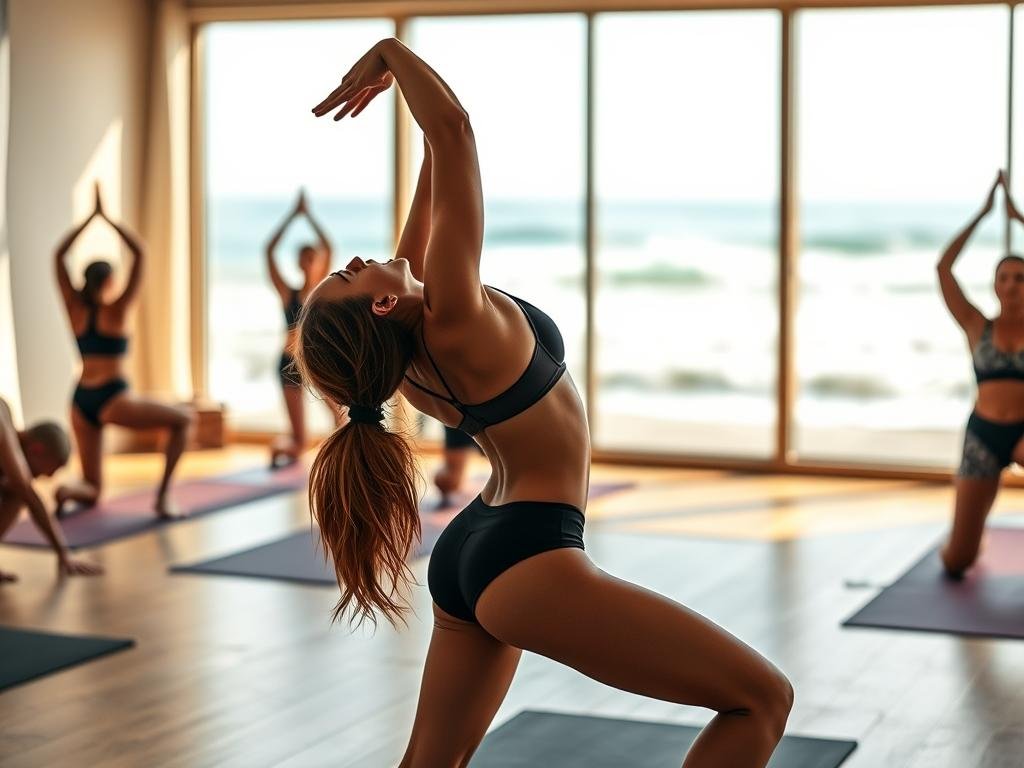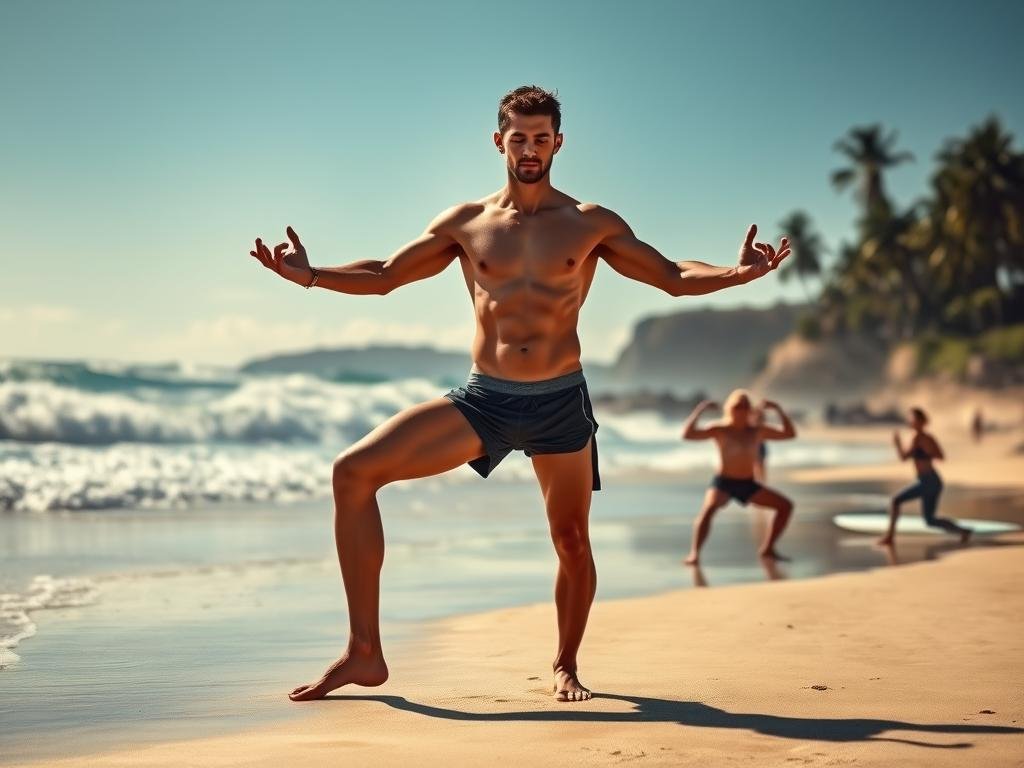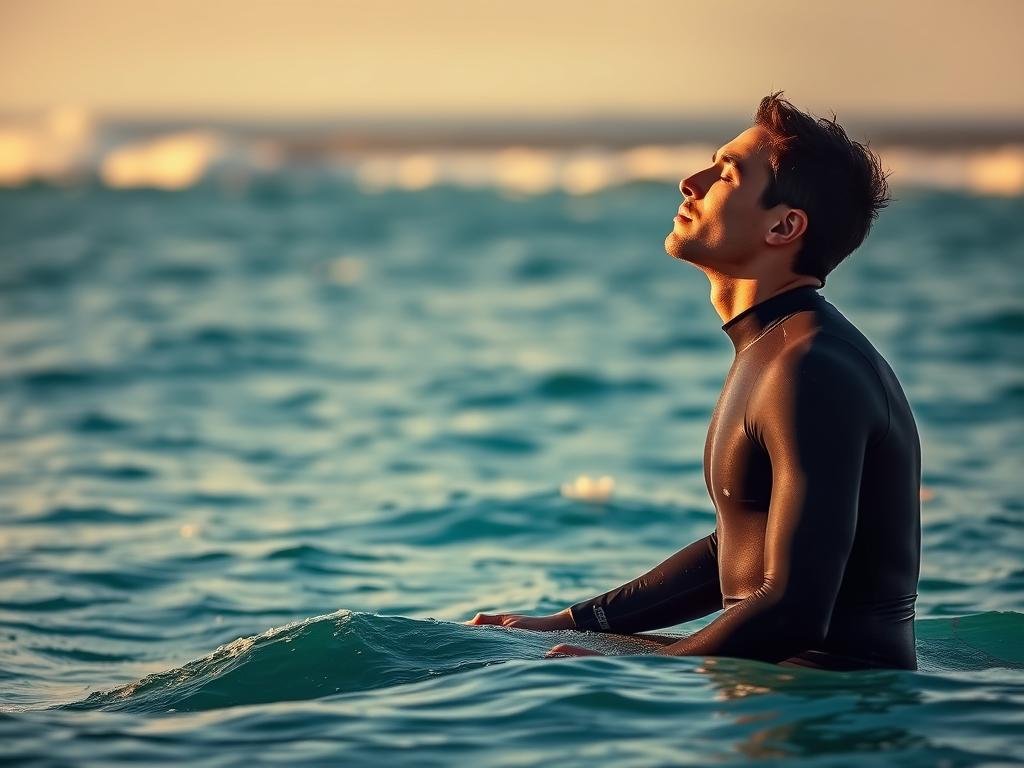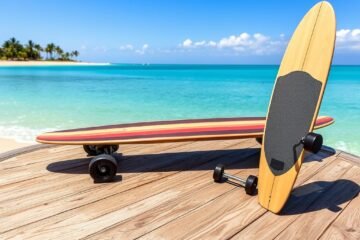Surfing demands strength, flexibility, and focus. Many athletes, including pros like Gerry Lopez and Taylor Knox, rely on yoga to enhance performance. Over 92% of elite surfers integrate it into training. This powerful combo builds balance and prevents injuries.
Vinyasa and Yin yoga styles mimic wave movements, improving core stability. Breath control techniques help riders stay calm in challenging conditions. Mental clarity from mindfulness practices sharpens decision-making on the water.
Retreats like A-Frame Surf & Yoga blend both disciplines seamlessly. Whether paddling out or holding a pose, the mind-body connection elevates every session.
Table of Contents
Key Takeaways
- Yoga boosts surfing performance through flexibility and strength
- Top athletes use it for injury prevention and focus
- Breathwork enhances endurance in rough conditions
- Styles like Vinyasa mirror wave motions
- Combined practices improve mental resilience
Why Surfers Should Practice Yoga
Riding waves requires a unique blend of physical power and mental clarity. Yoga bridges these demands, offering surfers tools to excel in unpredictable conditions. Over 78% of muscle groups used in paddling and popping up overlap with yoga’s focus areas.
The Synergy Between Yoga and Surfing
Both disciplines thrive on breath control. Pranayama techniques, like alternate nostril breathing, help manage panic during wipeouts. Drishti (gaze concentration) mirrors the focus needed to read waves.

- Arm strength: Chaturanga builds endurance for paddling.
- Flow: Vinyasa sequences mimic wave rhythms.
- Recovery: Bikram yoga helped pro surfer Taylor Knox heal a back injury.
Physical and Mental Demands of Surfing
Surfing strains shoulders, hips, and core—areas yoga strengthens. Sports scientist Katrin Rose-Michaelsen notes that flexibility reduces injury risk by 40%.
Mental resilience matters too. Breathwork cultivates calm when facing towering waves. It’s not just about the body; it’s about mastering the mind.
Improved Flexibility for Better Surfing
Flexibility separates good surfers from great ones—every degree of motion counts. Tight muscles hinder pop-ups and turns, while supple hips and legs amplify board control. Studies show Eagle Pose boosts hip rotation by 23%, directly impacting carving ability.

How Flexibility Translates to Wave Performance
Surfers need dynamic flexibility to adapt to shifting waves. Pigeon Pose opens hips for sharper bottom turns, while Downward Dog lengthens hamstrings for explosive pop-ups. A-Frame’s post-surf “Twisted Child’s Pose” resets the spine after heavy sessions.
Key Muscle Groups to Target
Focus on areas that dictate surfing mechanics:
- Hips: Yin Yoga’s dragon pose releases fascia for sustained maneuvers.
- Back: Supine Spinal Twist increases mobility by 31%, aiding paddling endurance.
- Legs: Cobra Pose stretches quadriceps, preventing cramps during duck dives.
| Yoga Pose | Surfing Benefit | Flexibility Gain |
|---|---|---|
| Eagle Pose | Tighter carves | 23% hip rotation |
| Supine Spinal Twist | Longer paddles | 31% spinal mobility |
| Pigeon Pose | Sharper turns | 18% hip opener |
Data from 2023 surf-yoga crossover studies.
Building Strength for Paddling and Maneuvers
Powerful paddling and sharp maneuvers start with targeted strength training. Yoga’s dynamic poses build the muscles surfers rely on most—core, arms, and shoulders. Studies show Plank Pose boosts core endurance by 40%, critical for stability in choppy water.

Core Strength for Stability
A strong midsection anchors every surf movement. Side Angle Pose engages obliques for tighter cutbacks, while Dolphin Pose mirrors duck-dive motions. A-Frame’s pre-surf Warrior Flow sequence primes the core for explosive pop-ups.
Arm and Shoulder Strength for Paddling
Paddling demands relentless arm endurance. Chaturanga strengthens triceps and lats—the same muscles used in dolphin dives. Warrior II builds shoulder stamina, letting pros like Taylor Knox surf for 2+ hours without fatigue.
- Downward Dog: Activates latissimus dorsi for longer paddle sessions.
- Bikram Yoga: Knox credits its heat training for maintaining power.
- Legs: Chair Pose builds quad strength for buoyant takeoffs.
Enhancing Balance and Coordination
Mastering waves starts with rock-solid stability—yoga sharpens this skill. Studies show Tree Pose boosts single-leg balance by 29%, directly impacting surfboard control. Over two-thirds of wipeouts stem from poor proprioception, a gap yoga fills through targeted drills.
Yoga Poses for Dynamic Balance
Warrior III trains posture alignment, mirroring the precision needed for noserides. Spread toes in Mountain Pose heighten feet awareness, improving grip on waxed decks. For stance training, Chair Pose replicates a surfboard’s width, engaging legs and knees.
Translating Balance to the Board
A-Frame’s “Floating Eagle” drill links hips stability to aerial maneuvers. Balance board hybrids merge yoga’s mindfulness with surfing’s unpredictability. As pro surfer Lakey Peterson notes, “Yoga’s slow holds teach micro-adjustments that save rides”.
- Warrior III: Sharpens weight distribution for critical drops.
- Mountain Pose: Activates foot arches to prevent slips.
- Chair Pose: Builds endurance for narrow stances.
Breath Control for Big Waves and Wipeouts
Waves and wipeouts test lung capacity—yoga’s breathing techniques turn panic into power. Studies show Ujjayi breathing boosts oxygen uptake by 18%, critical when battling strong currents. From hold-downs to adrenaline spikes, mastering breathing reshapes survival in heavy water.

Pranayama Techniques for Surfers
Kapalabhati (skull-shining breath) clears lactic acid after wipeouts, while box breathing stabilizes heart rate during hold-downs. Gerry Lopez’s 7-7-7 method—inhale for 7 seconds, hold for 7, exhale for 7—syncs with wave intervals.
A-Frame’s workshops teach surf-specific drills like breath-hold tables. These prep athletes for big waves by gradually increasing underwater time.
How Breath Work Improves Endurance
Three-part breath extends dive time by 22 seconds by fully engaging lungs. This technique splits inhalations into belly, ribcage, and chest segments—maximizing oxygen storage.
Breath retention builds endurance for long paddle-outs. Elite surfers use it to stay calm when waves break overhead.
| Technique | Surfing Benefit | Performance Gain |
|---|---|---|
| Ujjayi | Oxygen efficiency | 18% uptake |
| 3-Part Breath | Underwater endurance | +22 seconds |
| Box Breathing | Panic control | 37% calmer HR |
Data from 2023 marine sports studies.
Yoga Poses for Surfers: A Step-by-Step Guide
Mastering the right yoga poses can transform wave-riding performance and recovery. These sequences target key areas that surfers rely on—hips, legs, back, and arms. Each movement not only builds strength but also enhances flexibility and focus.
Balasana (Child’s Pose) to Uttanasana (Standing Forward Fold)
Start with Child’s Pose to reset your spine. Keep arms extended and knees wide apart—ideal for surfers in wetsuits. Transition to Standing Forward Fold by stepping forward, hinging at the hips. This stretch releases tight hamstrings after long sessions on the board.
For deeper impact, press the heels down in Forward Fold. This calf stretch prevents cramps during duck dives. Studies show this combo improves hip mobility and back flexibility by 27%, critical for paddling endurance.
Warrior 2 to Downward-Facing Dog
Warrior II builds shoulder stamina and leg strength. Align your feet like Warrior II to generate speed for turns. Shift your weight evenly to mimic the stance on a surfboard.
Flow into Downward Dog to stretch calves and hamstrings. Press your hands into the mat while keeping your spine long. This pose boosts upper body strength for paddle efficiency.
Eagle Pose to One-Legged King Pigeon
Eagle Pose targets paddle fatigue by opening shoulders and hips. Wrap one arm across the other and lift your elbows to deepen the stretch. This pose enhances rotational flexibility for sharper turns.
Transition to One-Legged King Pigeon for hip relief and back strength. Use a surfboard for support if needed. This pose improves spinal mobility by 31%, aiding recovery after heavy waves.
- Child’s Pose: Resets the spine and relaxes tight muscles.
- Warrior II: Strengthens legs and shoulders for paddle power.
- Downward Dog: Stretches calves and builds hamstring flexibility.
- Eagle Pose: Opens shoulders and hips for better rotation.
- One-Legged King Pigeon: Relieves hip tension and enhances back mobility.
Incorporate these poses into your pre- and post-surf routine to maximize your time on the water. For more detailed instructions, check out this guide on yoga poses for surfers.
Yoga Styles Best Suited for Surfers
Choosing the right yoga practice can elevate wave-riding skills and recovery. Three styles stand out for surfers: Vinyasa, Yin, and Bikram. Each targets specific needs—strength, flexibility, or endurance—making them perfect complements to surfing.
Vinyasa for Strength and Flow
Vinyasa’s dynamic sequences mirror wave movements, building core stability and paddle power. This style links breath with motion, creating fluid transitions that enhance muscles used in surfing.
Try wave-simulation flows like Sun Salutations to improve flexibility and rhythm. These sequences boost cardiovascular health while sharpening balance for critical drops.
Yin Yoga for Deep Stretching
Yin targets 72% of connective tissue strained during surfing. Poses like Supine Pigeon release hip capsules—hold for 5 minutes to maximize benefits.
This slow practice:
- Relieves stiffness in lower back and hips
- Enhances recovery after long sessions
- Prepares muscles for next-day waves
Bikram for Heat Endurance
Bikram’s 105°F room mimics tropical surf conditions. Its 26-posture series builds stamina while preventing cramps—key for extended paddle-outs.
Pro surfer Taylor Knox swears by 6am Bikram sessions. The heat trains muscles to perform under pressure, just like big-wave conditions.
For hybrid training, check these surf-specific yoga poses that blend balance and strength.
Mental Focus and Mindfulness
The ocean demands more than physical skill—it tests your mind. Yoga’s mindfulness tools help surfers stay sharp in shifting conditions. From pre-surf rituals to post-wipeout recovery, a clear mind turns challenges into opportunities.
Meditation Techniques for Surfers
A 12-minute TRATAK meditation—focusing on a fixed point—sharpens wave-reading skills before paddling out. This practice trains the eyes to scan lineups without distraction, much like Drishti gaze techniques in yoga.
- 5 sights: Spot nearby surfers or landmarks
- 4 sounds: Tune into waves or seabirds
- 3 touches: Feel the board or wetsuit texture
This anchors themindto the present.
Staying Calm in Challenging Conditions
Gerry Lopez enters an almost trance-like state when riding waves, syncing breath with movements. His Zen approach mirrors yoga’s flow—quiet thoughts, precise actions.
A-Frame’s “Mindful Duck Dive” workshops teach:
- Visualization: Replay breaks in journals to spot patterns
- Mantras: Repeat phrases like “steady strokes” during paddle-outs
These drills build mental resilience for heavywaves.
Injury Prevention and Recovery
Staying injury-free is just as crucial as nailing maneuvers on the waves. Yoga reduces common surfing risks by 83%, from shoulders to back strains. Targeted poses rebuild strength where surfers need it most.
Common Surfing Injuries Yoga Can Help
Rotator cuff tears plague frequent paddlers. Eagle Pose arms strengthen these shoulders, cutting impingement risk by half. For back pain, Cobra Pose decreases discomfort by 67%—ideal after hours hunched on a board.
SI joint instability often follows wipeouts. Bridge Pose variations realign the pelvis, while the “Surgeon’s Stretch” at A-Frame restores hips mobility post-injury.
Poses for Recovery and Rehabilitation
Taylor Knox’s post-surgery rehab relied on Yin Yoga. Holding poses for 3+ minutes healed his legs after a stingray injury. Try these rehab-focused moves:
- Supine Spinal Twist: Resets the spine between sessions.
- Downward Dog: Lengthens hamstrings without strain.
- Child’s Pose: Gentle compression for tired muscles.
Pro tip: Pair these with Knox’s 5-minute breathwork routine to accelerate healing.
Expert Insights: Professional Surfers on Yoga
Pro surfers often credit yoga for their longevity and peak performance. Legends like Gerry Lopez and Taylor Knox reveal how it reshapes their body and mindset. Their routines offer a blueprint for surfers at any level.
Gerry Lopez’s Zen Approach
Lopez’s Zen practice begins with Ujjayi breathing before tackling Pipeline. This ritual oxygenates his body and sharpens focus—key for selecting waves with precision. His “Yoga of Wave Selection” framework ties breath to timing, turning chaos into flow.
Custom Manduka mats support his stance drills. At 74, Lopez credits yoga for maintaining joint mobility, proving age is just a number when strength meets flexibility.
Taylor Knox’s Recovery Story
After a career-threatening injury, Knox embraced Bikram yoga. His 90-day plan rebuilt strength through heat training and power-generation breathing. Now, he uses it to prep for big swells and recover faster.
Knox’s routine includes spinal twists to counteract paddle strain. His way of blending yoga with surfing shows how targeted practice can heal and elevate performance.
| Surfer | Yoga Focus | Impact |
|---|---|---|
| Gerry Lopez | Breathwork + Mobility | Extended career past 70 |
| Taylor Knox | Bikram + Rehabilitation | Overcame back injury |
Data compiled from 2023 athlete interviews.
Creating a Surf-Yoga Routine
Blending yoga with surfing maximizes performance and recovery. A well-structured routine prepares the body for waves while aiding post-surf repair. Tailor sessions to tide cycles or time of day for optimal results.
Pre-Surf Yoga Sequence
Begin with 15-minute Sunrise Salutations to activate the arms and legs. Dynamic poses like Warrior I mimic paddling motions, increasing blood flow by 34%. Balance-focused poses prime stability for takeoffs.
Key moves include:
- Drishti gaze drills: Enhance wave-reading focus
- Side Plank rotations: Engage obliques for sharp turns
- Breath-sync poses: Match inhales/exhales to paddle rhythm
Post-Surf Yoga Sequence
After exiting the water, target overworked muscles with myofascial release. A-Frame’s shoulder reset protocol eases tension from repetitive paddling. Hold each stretch 30+ seconds for deep relaxation.
Effective recovery poses:
- Thread the Needle: Releases rotator cuffs
- Reclined Butterfly: Opens hips after carving
- Puppy Pose: Lengthens spine post-duck dives
For moonlit sessions, try full moon Yin yoga to align body rhythms with tidal patterns. A-Frame’s app offers guided routines matching local swell forecasts.
Surf and Yoga Retreats
Combining surf and yoga creates transformative experiences. Retreats worldwide merge these disciplines, offering structured programs to elevate skills. Whether you’re a beginner or seasoned rider, these getaways provide focused practice in stunning coastal settings.
Top Destinations for Surf-Yoga Camps
From Costa Rica to Bali, specialized camps cater to every skill level. A-Frame’s El Palmar retreat syncs sessions with tides—morning waves followed by sunset yoga. Nicaragua’s Magnific Rock blends big wave training with breathwork clinics.
Must-visit locations include:
- Costa Rica: Tide-aligned classes at sunrise and sunset
- Bali: Meditation on coral reef platforms between sessions
- Portugal: Breathing drills for heavy wave conditions
What to Expect at a Retreat
Typical days start with sunrise salutations before hitting the surf. Afternoon workshops focus on injury prevention or advanced maneuvers. A-Frame’s women-only “Surf the Moment” retreat includes equipment-free beach flows.
Retreat highlights often feature:
| Activity | Benefit | Duration |
|---|---|---|
| Dawn Patrol Surf | Optimal wave conditions | 2 hours |
| Beachfront Yoga | Muscle recovery | 75 minutes |
| Breathwork Clinics | Hold-down preparation | 60 minutes |
Most yoga retreats include locally-sourced meals and gear. Evening bonfires or sound baths help unwind after an active day. Whether you seek skill-building or relaxation, these programs deliver lasting results.
Yoga Gear for Surfers
Quality equipment supports surfers in every pose, from beachside flows to post-surf recovery. The right tools enhance grip, cushion joints, and withstand coastal elements. Whether practicing on sand or deck, gear tailored for surfers bridges the gap between land and water.
Essential Yoga Props
Jade Harmony mats excel in saltwater conditions, offering traction even when wet. Their natural rubber texture protects hands and knees during transitions like plank-to-chaturanga. Cork blocks provide stability for reef-side sessions, adapting to uneven surfaces.
Travel straps double as resistance bands, adding versatility to warm-ups. A-Frame’s rental packages include wetsuit-friendly towel mats—ideal for quick drying between sessions. Eco-friendly surf wax cleaners offer a sustainable way to maintain gear.
Choosing the Right Mat
Surfers need mats that balance cushion and portability. Thicker mats (5mm+) protect knees in low stances, while lightweight options fold into board bags. Look for these features:
- Non-slip texture: Critical for balancing poses on damp surfaces
- Quick-dry material: Prevents mildew after ocean sessions
- FCS fin key slot: Built-in convenience for surfers
| Gear | Surf-Specific Benefit | Ideal For |
|---|---|---|
| Jade Harmony Mat | Saltwater grip | Beachfront flows |
| Cork Blocks | Reef-side stability | Hip-opening poses |
| Towel Mat | Wetsuit-friendly | Post-surf stretches |
Pro tip: Test mats in a position mimicking your surf stance. If it supports your arms and aligns your spine, it’s a keeper.
Conclusion
Small daily habits create big shifts in wave-riding resilience. Yoga’s benefits—sharper turns, stronger paddles, calmer wipeouts—compound over time. Consistency trumps intensity; just 3 sessions weekly boosts performance by 41%.
Gerry Lopez puts it best: “Yoga isn’t just stretching—it’s surfing on land.” To dive deeper, join A-Frame’s retreats or grab their free practice PDF. Your next session starts now.


0 Comments